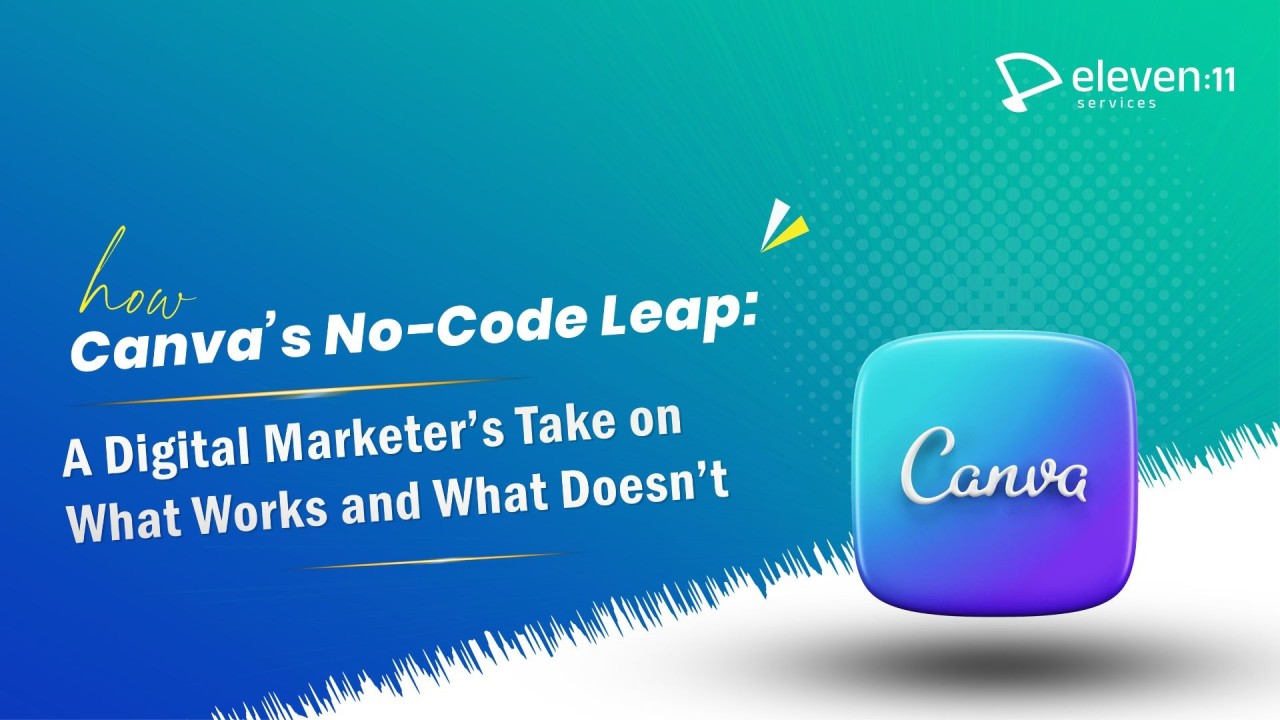Canva’s No-Code Leap: A Digital Marketer’s Take on What Works and What Doesn’t

The no-code revolution has opened up a world of possibilities empowering marketers, designers, and creators to build tools, websites, and workflows without touching a single line of code. And now, Canva, a brand once known solely for its beginner-friendly graphic design platform, is stepping into the no-code arena.
At Canva Create 2024, the platform unveiled a suite of AI-powered and productivity-enhancing tools marking its boldest evolution yet. Canva wants to become your one-stop shop for design, content, presentations, documents, and now even websites and apps.
As someone actively involved in the digital marketing space, I was excited to try these tools out firsthand. I’m Keerthana, a Digital Marketing Intern at eleven:11 Services, and this is my honest review of Canva’s new capabilities, especially its foray into the no-code landscape and how it compares to existing giants like Webflow, Bubble, and Framer.
The Big Picture: What Canva Announced
During Canva Create 2024, the company introduced a collection of new tools under what they’re calling Magic Studio, a set of AI features designed to automate content creation, design, and now, even website and app layouts.
Here are some of the standout updates:
✅ Magic Design
Enter a few keywords, and Canva will generate templates, visuals, and complete slide decks based on your input. Perfect for quick campaign ideation or pitch decks.
✅ Magic Write
An AI writing assistant that generates copy in your tone of voice. Canva even lets you train it with a sample of your brand language.
✅ Magic Switch
Automatically repurpose one design into multiple formats turn a presentation into a blog post, a document into an Instagram carousel, or a whiteboard into a report.
✅ Canva Code
The headline feature that really caught my attention: Canva Code promises to generate apps or web layouts from a single prompt. Think: “Build me a portfolio site” → and Canva instantly spins up a working visual.
✅ Canva Sheets & Unified Editor
Visually powered spreadsheets and a unified canvas to combine documents, presentations, whiteboards, and charts all synced and collaborative.
✅ Enterprise-Level Controls
New tools for branding, permissions, and organization-wide design systems especially helpful for scaling teams.
My Experience Using Canva Code: Impressive Start, But Room to Grow

Curious about the no-code hype, I tested Canva Code by typing a basic prompt: “Create a travel-themed landing page with a hero section, image gallery, and contact form.”
And within seconds boom Canva generated a neat layout with placeholders and decent structure.
Here’s what worked:
- Speed: The layout was ready in under a minute.
- Clarity: Clean visual design, auto-aligned elements, and good UX.
- Use cases: Perfect for quick concept mockups or internal visuals.
But here’s where things fell short:
- Lack of customization: You can’t deeply edit structure or interactions.
- No dynamic content or logic: Unlike real no-code platforms, Canva Code doesn’t handle logic, databases, or responsive tweaks well.
- Export limitations: No advanced export for developers or integration options.
As a marketer who works closely with designers and developers, I saw it more as a wireframing tool or presentation aid, rather than a production-level solution.
How Canva Stacks Up Against Popular No-Code Platforms
To understand Canva's position in the no-code ecosystem, it’s helpful to compare it with some of the industry’s leading tools:
Recommended Blogs
Explore the basics of Marketing and its applications.




